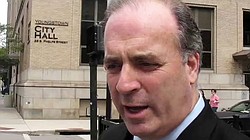Planner’s Rx for city growth: Don’t rush to sell vacant land
Rebuilding The Cities That Built America

More than 200 people attended "Rebuilding The Cities That Built America" a conference in Youngstown, OH. Keynote speaker was Daniel Kildee of the Center For Community Progress.
By DAVID SKOLNICK
YOUNGSTOWN
If the Youngstown, Cleveland and Pittsburgh regions are to thrive, their political and community leaders must “adapt to a different type of thinking” about vacant property.
That was the advice Dan Kildee, president and co-founder of the Center for Community Progress, gave to about 250 leaders from the three cities Friday at the “Rebuilding the Cities that Built America” conference.
The conference was at Trinity United Methodist Church in the downtown.
A major mistake made by cities, particularly those that are cash-strapped, is to sell vacant property to someone or a company right away instead of taking the time to evaluate its best use, Kildee said.
“Rather than get quick cash, you need to determine what is the best long-term solution for property,” he said.
Kildee’s organization provides advice, research and technical assistance to support the productive reuse and revitalization of vacant or underused property, particularly in cities.
Political and community leaders largely think of vacant property as “an annoyance, a burden, and it’s harder for us to do work because of vacant property,” Kildee said, “rather than think of it as a place for new life.”
Kildee is the former president of the Genesee Institute in Flint, Mich., which focuses on urban land reform and land banking. He also served as Genesee County treasurer and county commissioner.
While Genesee County treasurer, Kildee created Michigan’s first county land bank. A land bank buys vacant property and sells it or gives it away when it finds its best use.
Youngstown, Campbell, Struthers and Austintown, along with Lien Forward Ohio, are working toward establishing a land bank in Mahoning County.
The conference brought together leaders from the three cities to share ideas on community and economic development, build working relationships, and work to support policies that affect the three regions, said Kirk Noden, executive director of the Mahoning Valley Organizing Collaborative.
The MVOC helped organize Friday’s conference.
“We’re able to be a lot more effective working together than doing it alone,” he said.
The three older industrial cities face similar challenges, Noden said.
They include population and job loss, declining property values, high foreclosure rates and declining tax revenue, he said.
“The Cleveland/Youngstown/Pittsburgh corridor has much in common,” said Josette Fitzgibbons, an official with the Urban Redevelopment Authority of Pittsburgh, that city’s economic development agency.
“By sharing what we do well, we don’t have to reinvent the wheel,” she said.
“We’re doing some good initiative work in our neighborhoods” such as increasing the amount of green space there and highlighting the city’s neighborhood commercial areas, she said.
 43
43
